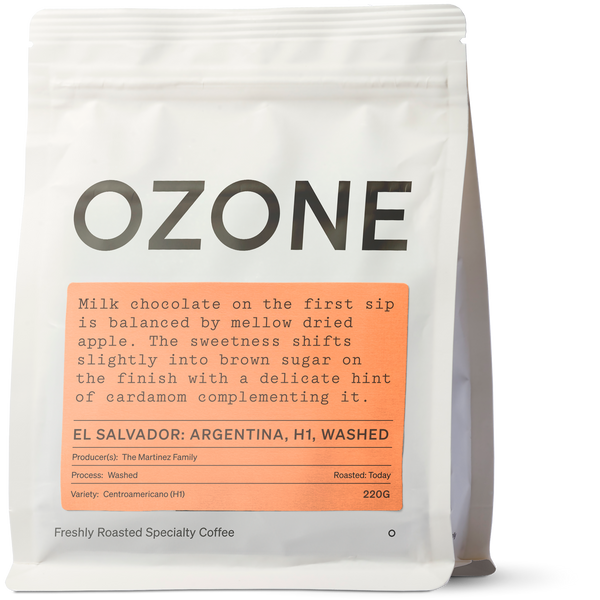Centroamericano H1 represents a breakthrough in coffee breeding: a first-generation hybrid that marries disease resistance with genuine specialty cup quality. Created through collaboration between CIRAD, PROMECAFE, and CATIE, this cross between rust-resistant Sarchimor T5296 and the prized Ethiopian landrace Rume Sudan yields up to 47% more than traditional varieties without sacrificing the complex flavours specialty roasters demand.
Centroamericano H1: The Hybrid That's Changing the Game
In the world of specialty coffee, we spend a great deal of time romanticising heirloom varietals and their centuries-old lineages. But sometimes the future arrives not through nature's patient evolution, but through deliberate, collaborative science. Centroamericano H1 represents precisely this kind of breakthrough: a first-generation (F1) hybrid that marries disease resistance with genuine cup quality, offering farmers a lifeline in an era of climate uncertainty and the relentless spread of coffee leaf rust.
What makes Centroamericano particularly compelling isn't just its agricultural resilience. It's that this hybrid manages to deliver specialty-grade flavour potential while yielding up to 47% more than traditional varieties. For an industry long accustomed to the painful trade-off between quality and productivity, that's nothing short of revolutionary.
Origins: A Pan-American Collaboration
Centroamericano H1 emerged from one of the most ambitious collaborative breeding programmes in coffee history. In the 1990s, Central American coffee producers faced a crisis: their finest-tasting varieties were devastatingly susceptible to coffee leaf rust (Hemileia vastatrix), while the disease-resistant alternatives available at the time simply couldn't match their cup quality. Something had to change.
The solution came through an unprecedented partnership between CIRAD (the French agricultural research centre), PROMECAFE (a regional network of Central American national coffee institutes), and the CATIE gene bank in Costa Rica. These organisations pooled their expertise and genetic resources to create something entirely new: F1 hybrids that would combine the best traits of their parent varieties without the quality compromises that had plagued earlier rust-resistant cultivars.
After years of careful breeding, field trials, and sensory evaluation, Centroamericano was officially released to farmers in 2010. The variety was specifically developed for Central American growing conditions, earning its name from the region it was designed to serve. Costa Rica's ICAFE recommended it particularly for the Turrialba terroir, where farms like Aquiares Coffee have since demonstrated its remarkable potential within shaded agroforestry systems.
The Centroamericano Family Tree
Centroamericano H1
A first-generation hybrid created by crossing the rust-resistant Sarchimor line T5296 with the Ethiopian landrace Rume Sudan. Centroamericano H1 combines exceptional disease resistance with specialty-grade cup quality potential. It yields 22-47% more than traditional varieties while maintaining the complex flavour characteristics prized by speciality roasters. Developed by CIRAD, PROMECAFE, and CATIE, it was specifically designed to address the twin challenges of coffee leaf rust and declining genetic diversity in Central American coffee.
Understanding the Genetics: A Calculated Cross
To truly appreciate Centroamericano, you need to understand its parentage. This isn't a simple two-variety cross; it's the convergence of carefully selected genetic lines, each bringing specific traits to the final hybrid.
The first parent is T5296, a member of the Sarchimor group developed at CATIE in Turrialba, Costa Rica (the "T" in its name). Sarchimors are themselves hybrids, created by crossing Villa Sarchi (a compact, high-altitude Bourbon mutation from Costa Rica) with the Timor Hybrid. The Timor Hybrid is that legendary spontaneous cross between Arabica and Robusta that occurred in East Timor in the 1920s, conferring rust resistance to its descendants. Through this lineage, T5296 brings disease resistance and a compact growth habit.
The second parent is Rume Sudan, a wild Ethiopian landrace collected from the Boma Plateau in South Sudan in 1941. Rume Sudan represents the flavour dimension of the equation. This pure, unmodified Arabica is known for its extraordinary cup quality, featuring intense floral aromatics, vibrant citrus notes, and remarkable complexity. While commercially impractical on its own due to low yields and disease susceptibility, Rume Sudan's genetics have proven invaluable in breeding programmes. It's also contributed to Kenya's celebrated SL28 and helped produce championship-winning coffees that took top honours at the 2015 World Barista Championship.
The "H1" designation indicates this is a first-generation hybrid, meaning each plant is the direct offspring of the T5296 × Rume Sudan cross. This F1 status is crucial: first-generation hybrids exhibit "hybrid vigour" (heterosis), producing plants that outperform both parents in growth, yield, and stress tolerance. However, this vigour doesn't reliably transfer to subsequent generations, which is why F1 hybrids like Centroamericano must be propagated vegetatively rather than grown from seed.
Physical Characteristics
Centroamericano presents as a compact, dwarf-stature plant, a trait inherited from its Villa Sarchi ancestry. This manageable size makes it significantly easier to cultivate and harvest compared to taller traditional varieties. The trees feature characteristic green-tipped leaves and produce large beans, a quality that appeals to both farmers seeking good export grades and roasters looking for even roast development.
One of the variety's most appealing agricultural traits is its precocity. Centroamericano begins bearing fruit in its second year of cultivation, considerably earlier than many traditional varieties that require three or more years before their first meaningful harvest. For farmers making the substantial investment of replanting their farms, this accelerated return on investment can make the difference between financial viability and failure.
The recommended planting density is 3,000 to 4,000 trees per hectare using single-stem pruning, though this can vary based on local conditions and farming practices. The trees respond well to shade and integrate effectively into agroforestry systems, aligning with sustainable farming practices that are increasingly important both ecologically and commercially.
Cup Profile: Where Science Meets Flavour
Here's the question that matters most to speciality coffee enthusiasts: how does it taste?
The honest answer is that Centroamericano's cup quality varies considerably depending on growing conditions. This is true of all coffee varieties, of course, but it's particularly notable with hybrids that carry Robusta genetics in their lineage. At lower altitudes or in suboptimal conditions, the coffee may lean toward a more practical, commodity-style profile. But when grown at elevations above 1,300 metres in healthy, well-maintained soil, Centroamericano can produce genuinely exceptional cups.
At its best, expect a complex flavour profile with notable sweetness and clean, bright acidity. The Rume Sudan parentage contributes potential for floral aromatics and fruity complexity, while the Sarchimor genetics provide body and balance. Specific tasting notes depend heavily on terroir and processing, but well-grown Centroamericano has shown characteristics including dark chocolate, red wine, orange blossom, and citrus notes.
World Coffee Research's International Multilocation Variety Trial (IMLVT) has consistently found that F1 hybrids like Centroamericano can achieve cup quality on par with traditional speciality varieties. In their global trials, varieties such as H1 Centroamericano exhibited flavour stability across different growing environments, a significant finding for farmers seeking predictable quality alongside agricultural resilience.
The key principle, as researchers often emphasise, is matching the right variety to the right place. Centroamericano excels in the humid, high-altitude environments of Central America's coffee regions, particularly when grown under shade in agroforestry systems. Farms like Aquiares in Costa Rica have demonstrated that when cultivated with care in suitable conditions, H1 can produce cups that rival their finest traditional Bourbon lots.
Growing Challenges: The Trade-offs
No variety is perfect, and Centroamericano comes with its own set of challenges that growers must carefully consider.
The most significant limitation is propagation. As an F1 hybrid, Centroamericano cannot be reliably reproduced from seed. Offspring from saved seed undergo "genetic segregation," meaning the carefully balanced traits of the parent don't transfer consistently to the next generation. This requires farmers to purchase vegetatively propagated plants (typically rooted cuttings or tissue culture plantlets) from specialised nurseries, adding both cost and complexity compared to traditional seed-propagated varieties.
The variety also has high nutritional requirements, particularly during establishment. The root system develops more slowly in the first two years, requiring careful attention to soil health and fertilisation. Farmers report that Centroamericano responds well to organic inputs and benefits from the kind of soil management practices associated with high-quality coffee production generally.
While resistant to coffee leaf rust, Centroamericano remains susceptible to nematodes, the microscopic soil-dwelling worms that can devastate coffee root systems. This vulnerability requires attention to soil health and, in some cases, may necessitate nematode management strategies.
Finally, there's the question of infrastructure and access. F1 hybrid nurseries require significant investment in laboratory facilities for tissue culture or carefully managed mother-plant blocks for cutting propagation. This infrastructure is gradually expanding across Central America, but availability can still be limited in some regions.
The Bigger Picture: F1 Hybrids and Coffee's Future
Centroamericano represents more than just another variety option for farmers. It's part of a broader shift in how the coffee industry approaches plant breeding and genetic diversity.
The Arabica coffee gene pool is remarkably narrow. Most commercial varieties share an estimated 98.8% genetic similarity, descended from just a handful of plants that left Ethiopia centuries ago. This genetic bottleneck leaves the industry vulnerable to diseases, pests, and climate change. F1 hybrids like Centroamericano offer a way to introduce new genetic diversity while maintaining the quality characteristics that the speciality market demands.
The CIRAD-led BREEDCAFS project (Breeding Coffee for Agroforestry Systems), launched in 2017 with European Union funding, is working to develop new hybrid varieties specifically adapted to climate change and shade-grown conditions. Centroamericano serves as a proof of concept that such hybrids can succeed commercially while delivering genuine cup quality.
World Coffee Research continues to evaluate F1 hybrids through their IMLVT, with roasters worldwide providing sensory feedback that shapes breeding decisions. This industry-led approach ensures that new varieties meet market demands rather than just agricultural criteria. The fact that major roasters are actively involved in evaluating varieties like Centroamericano speaks to the industry's recognition that quality and resilience must develop hand in hand.
The Verdict
Centroamericano H1 represents exactly the kind of intelligent compromise the coffee industry needs as it navigates the challenges of the 21st century. It won't replace traditional varieties in every context, nor should it. But for farmers facing rust pressure, seeking higher yields, or looking to diversify their genetic portfolio, it offers a compelling option that doesn't require sacrificing cup quality at the altar of productivity.
Is it the equal of the finest heirloom Bourbons grown in perfect conditions? Perhaps not always. But it's remarkably close, and it offers something those heirloom varieties cannot: the resilience to survive and produce in a warming, rust-afflicted world. For an industry that depends on the livelihoods of millions of smallholder farmers, that combination of quality and security may prove more valuable than any single exceptional lot.
When you encounter a well-grown Centroamericano on a roaster's menu, give it a chance. You may be surprised by what collaborative science and careful cultivation can achieve.
Quick Varietal Facts
- Varietal: Centroamericano H1
- Type: F1 Hybrid (Introgressed Arabica)
- Parentage: Sarchimor T5296 × Rume Sudan
- Origin: Central America, released 2010
- Developed by: CIRAD, PROMECAFE, CATIE
- Optimal Altitude: 1,300m and above
- Growth Habit: Compact/dwarf, green-tipped leaves
- Bean Size: Large
- Yield: Very High (22-47% above traditional varieties)
- First Harvest: Second year of cultivation
- Disease Resistance: Resistant to coffee leaf rust; tolerant of coffee berry disease; susceptible to nematodes
- Propagation: Vegetative (cuttings or tissue culture); cannot be reliably reproduced from seed
- Related F1 Hybrids: Milenio, Starmaya, Mundo Maya
- Typical Cup Profile: Complex with good sweetness; potential for chocolate, citrus, and floral notes when grown at high altitude
Further Reading
World Coffee Research Variety Catalog: Centroamericano
World Coffee Research: Evaluating Cup Quality in Global Arabica Trials
Perfect Daily Grind: Combating Climate Change with Hybrid Coffee Varieties
CATIE: F1 Hybrid Introduction in the Central American Dry Corridor
Interested in exploring Centroamericano's genetic relatives? Check out our articles on Villa Sarchi and Bourbon.

